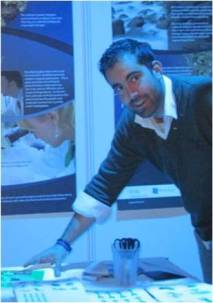
When planning the activity we were not sure if students should have total autonomy in the design of the experiment or if a more structured approach was better. We decided to give autonomy in the design and adapt it if things were not running well. Of course this decision was facilitated by the fact we were three volunteers with the kids, plus the teacher, thus support was always there. So, in the day, after a brief introduction to seaweeds and their use in biofuels, we gave the students the material for the experiment (a bottle, seaweeds, water and a balloon) and ask them to come up with an experiment to see which of the different seaweeds they had would produce more gas. To be honest, we were not expecting very complete or elaborated answers. These were 6 year old kids for whom science experiments are still a novelty. So, it was much to our surprise, that almost immediately one of the boys eagerly put his hand up and very confidently said: “we just put the seaweed in the bottle with water, cover it with the balloon and see which balloon gets bigger”. And just like that he planned on his own the experiment, much to our surprise and his pride. It was heartwarming to observe how happy he was with himself.
With this small episode I´m not arguing that total autonomy is always the best way for engaging and learning science, far from that. What I am arguing is that opportunities for the students to have autonomy to be innovative and creative need to exist. Independently if they get it right or wrong, in this type of activities this should not be the most important. Science outreach initiatives can then play a relevant role in providing these opportunities.